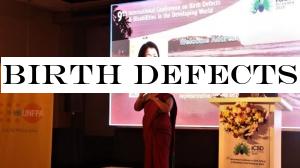INSUBCONTINENT EXCLUSIVE:
The United Nations Population Fund (UNFPA) in Sri Lanka hosts a panel discussion with national experts at the 9th International
Conference on Birth Defects and Disabilities in the Developing World.
Colombo, Sri Lanka (25 February 2020): People with disabilities are
amongst the most marginalized groups when it comes to sexual and reproductive health (SRH) services
Even when health services are physically accessible, women and young people with disabilities may face financial, social, and psychological
barriers to accessing adequate SRH services
However, persons with disabilities have a greater need for comprehensive sexuality education and care than persons without disabilities due
to their increased vulnerability.
The United Nations Population Fund (UNFPA) brought together experts from the fields of medicine and
sociology for a panel discussion today, as part of the 9th International Conference on Birth Defects and Disabilities in the Developing
The panel discussion titled &Addressing birth defects from the lens of Human Rights - Inclusion," focused on human rights and a gender
equality angle to disability and birth defects.
Delivering the welcome remarks, UNFPA Representative in Sri Lanka, Ms
Ritsu Nacken, said, &One billion people, or 15% of the world population, experience some form of disability
In order to achieve the SDGs, we need to ensure that persons with disabilities have equal access to services, including SRH services, and
are able to exercise their rights fully
They must be active agents of change and part of our collective journey towards an inclusive, just and sustainable society.&
In May 2008,
the Convention on the Rights of Persons with Disabilities came into force and Sri Lanka ratified the Convention in 2016
This was the first legally binding international treaty on disability
It specifically mentions the rights of people with disabilities to access sexual and reproductive health services
However, these services are often inaccessible to persons living with disabilities for many reasons including physical barriers, stigma and
Sexual and reproductive health services have been largely overlooked in policy, planning and service delivery by social, legal, health and
welfare services.
Professor Subhangi, Professor in Sociology at the Department of Sociology, University of Colombo, highlighted that &The
ignorance and attitudes of society and individuals raise most of these barriers & not the disabilities themselves
People with disabilities cannot be generalized as one group, and one-size-fits-all solutions do not work for everyone
For example, people with intellectual disabilities are further marginalized because most services focus on people with physical and visible
Athula Kaluarachchi, Senior Lecturer in Obstetrics - Gynecology at Faculty of Medicine, University of Colombo discussed the importance of
providing equal reproductive health services to people with birth defects and disabilities
&Just like everyone else, people with disabilities should be able to enjoy a sexual life as well as have children if they wish
They must have equal access to family planning and antenatal care among other things
It is imperative that the service providers keep in mind their responsibilities towards people with birth defects and disabilities when
planning and implementing reproductive health programmes.&
The panel also included Dr Shyamani Hettiarachchi, Senior Lecturer in the
Department of Disability Studies, Faculty of Medicine, University of Kelaniya
The panel was moderated by Janitha Rukmal, disability rights activist and the Co-founder of Enable Lanka Foundation
The discussion provided a platform for open dialogue between policy makers, health professionals, academics, civil society, media, and other
stakeholders, as it explored Sri Lanka progress and the way forward in relation to inclusion and the 2030 Agenda on Sustainable Development.

